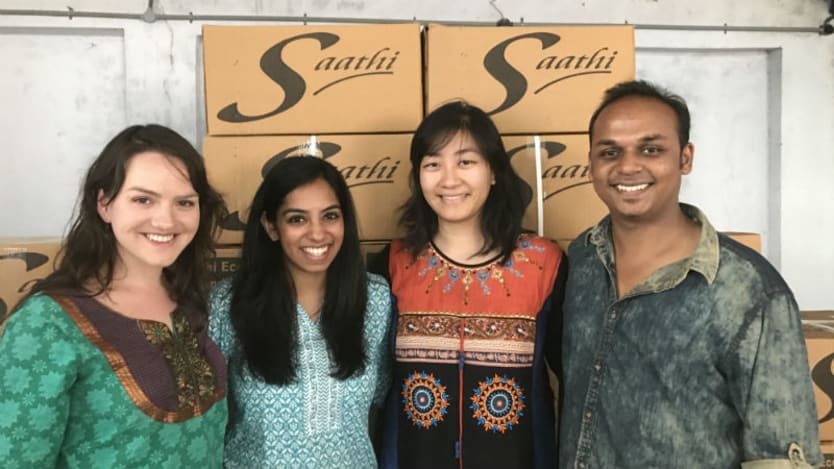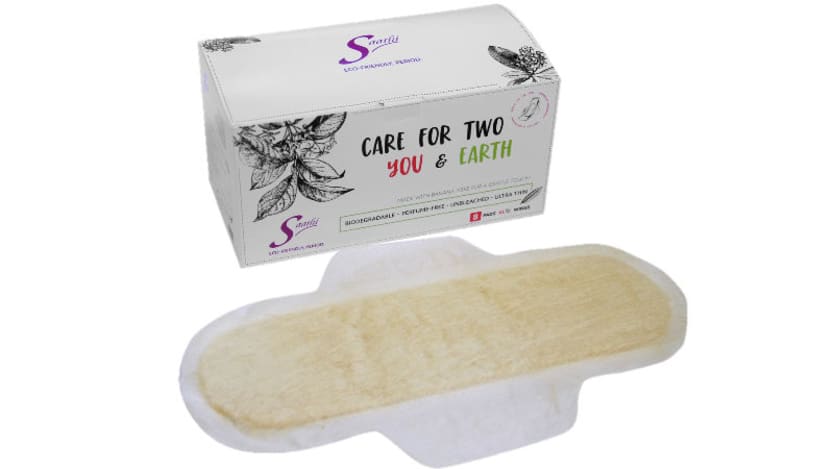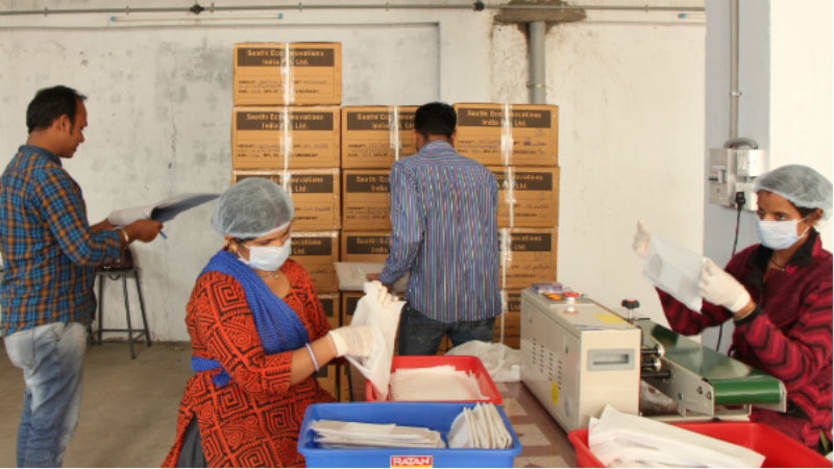In India, can a manufacturing startup lead a feminine hygiene revolution?

HYDERABAD, India — Mechanical engineer Tarun Bothra didn’t expect to become an expert on the production of sustainable sanitary pads. But now on his fourth iteration of a biodegradable banana tree fiber pad for women, he’s become just that.
In 2015, Bothra, along with co-founders Amrita Saigal, Kristin Kagetsu, and Grace Kane, founded Saathi, a startup based in Ahmedabad, India, to produce affordable, environmentally friendly sanitary pads.
Two years later, the team is mass producing pads out of their own manufacturing facility, and selling them in urban centers for a competitive 20 rupees, or $0.30, a pad and online for 178 rupees ($2.8) per box of eight in order to subsidize distribution of free pads in rural areas with the help of NGO partners.
“We thought that people wouldn’t pay a premium price in urban areas for a product that is chemical free, but we found they will if it works,” Bothra said.
Along the way, they’ve learned that tackling the production of a feminine hygiene product in India is impossible without taking on the taboos and societal myths still so stubbornly attached to menstruation throughout the country.
Bothra originally came on board to provide his expertise for an entirely different idea: The design of a low-cost machine that women in rural areas could use to manufacture and sell their own sanitary pads using local materials. Later, their research showed that “there were other companies working in the same sector for seven or eight years in India, and they hadn’t gotten out of the cities or the state they were working in,” Bothra said. “We wanted a global reach.”
At the same time, the founders took note of another problem in the form of super absorbent polymers used in most commercial pads sold worldwide — the kind of water-soluble plastic that can take more than 500 years to decompose in a landfill. In India, this is compounded by loose standards that don’t require feminine hygiene product producers to disclose what goes into the making of their pads.

Most plastic sanitary pads use chlorine-bleached wood pulp as an absorbent, while many eco-friendly pads use cotton. The Saathi team determined they could replace plastic with plant-based solutions to retain comfort and decided that banana tree fiber — a material readily available anywhere bananas are farmed and normally discarded after harvest — would be the choice absorbent.
Realizing that no other sanitary pad manufacturer in India was focused on scaling the same combination of sustainability and comfort was a turning point, Bothra said. But it also meant starting from scratch — and for Bothra to dive into a world of design he knew nothing about.
A last mile solar startup wins big at Global Entrepreneurship Summit
A distribution solution for energy products in rural India claimed the spotlight at the Global Entrepreneurship Summit in Hyderabad, India, on Thursday night, when founder Ajaita Shah won the event's pitch competition.
“You tell me to make robot, I’ll build it, you tell me to make a machine for a product you want to create, I’ll make it … but how was I supposed to know how to make a sanitary napkin?” Bothra told Devex on the sidelines of the Global Entrepreneurship Summit in Hyderabad, India.
The first pad he made “was really bizarre, it was like a big pillow,” Bothra said. Months of direction from his three female co-founders along with trials in a control group of 600 women across India allowed the team to hone in on a thinner, chemical-free, comfortable design that’s 50 percent more absorbent than commercial pads of the same size and biodegrades in about six months.
But if the Saathi team thought the pad engineering would be the toughest challenge to tackle, the resistance to product use and even the feedback process during the trials proved otherwise. It was a lesson, Bothra said, in just how taboo a subject menstruation remains in India, where women are often considered “impure” or dirty during their period and many are compelled to follow dietary restrictions, avoid physical contact and miss out on school or social functions. Bothra himself grew up in a household where his mother was not allowed to touch him or cook food for him during menstruation due to the family’s strict Hindu beliefs.
Unsurprisingly, the young engineer faced difficulty in the field during the initial feedback process. As the designer of the product, he was trying to speak with women directly with little success: “Me, even being Indian, if I go to a village, I’m a foreigner to them because I’m coming to sell something. I can tell them about the benefits, but to them I’m a salesman.”
Not only that, but he was far less likely to receive honest responses as a man asking a woman about her experience using a sanitary pad.

In an effort to create a more successful feedback loop, Saathi partnered with Ekal Vidyalaya, a foundation focused on education in rural India whose staff had worked in the target communities for years and formed strong relationships with women there. For the past year, Saathi with the help of Ekal Vidyalaya has been educating women on the reasons for sanitary pad use over traditional cloth or other more skin-irritating means, supplying the product and collecting data to improve future design — which may see a tweak to better suit the activities of rural women — and distribution.
In the meantime, the startup is gaining momentum, sweeping the recent Hello Tomorrow Global Challenge in Paris to win a total of 120,000 euros ($142,000), adding to a growing tally of grants and investments. The group hopes to break even by 2018, and will in the future be looking to the Government of India to put money toward subsidizing the cost of pads for rural women.
For Bothra, who had planned to pursue an MBA before becoming involved in Saathi, the mission has grown larger than the innovative use of alternative materials or providing affordable sanitary pads. Three months after founding Saathi, which means friend in Hindi, his mother told him the story of something he’d done as a young child. Upset that his mother’s touch was restricted at certain times and confused as to why, he went to his doting grandmother and told her very bluntly that he hated it.
“It was because our religion didn’t allow us [to touch], but my grandmother realized I was too young to understand … so she fought it and made it right in our house, and it never happened again.”
Now, Bothra hopes Saathi is not only creating a sustainable, affordable feminine hygiene product, but also building on the taboo-breaking movement he unwittingly started as a child.
Read more Devex coverage on social entrepreneurship.
Search for articles
Most Read
- 1
- 2
- 3
- 4
- 5
